Say NO to Body Shame–Yours and Mine
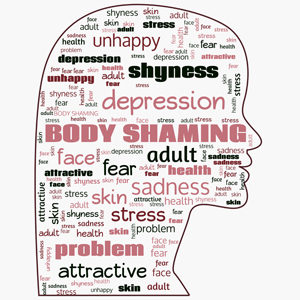 Okay. I’ll admit it. I’ll confess. Sometimes, when I see plus-sized models, I snicker. Out loud. Sometimes, I comment. It’s never a nice comment. I’m not proud. I’m actually ashamed. And … but … that’s the last thing I should be.
Okay. I’ll admit it. I’ll confess. Sometimes, when I see plus-sized models, I snicker. Out loud. Sometimes, I comment. It’s never a nice comment. I’m not proud. I’m actually ashamed. And … but … that’s the last thing I should be.
“Why?” you might ask. “Diane, that’s awful of you!” you might say. “You—who claim to want to help others step into their power, make space for all voices, for everybody. You should be ashamed!”
“No,” I’d say. “Shame is never the answer.”
Shame is, however, the reason.
The reason for the eye rolls, the comments. All judgements—mean-spirited judgements—are born and rise from shame.
And from projection.
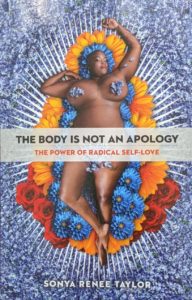 We are “less tolerant of the bodies of others, not because we are bad people but because we are guilty of each of those counts against ourselves.” This pearl of wisdom comes from Sonya Renee Taylor’s The Body Is Not an Apology. Thank you, dear Sonya Renee Taylor, for helping me see that whenever I say (or think) less-than-kind things about other’s bodies, I am probably guilty of a lack of compassion for my own.
We are “less tolerant of the bodies of others, not because we are bad people but because we are guilty of each of those counts against ourselves.” This pearl of wisdom comes from Sonya Renee Taylor’s The Body Is Not an Apology. Thank you, dear Sonya Renee Taylor, for helping me see that whenever I say (or think) less-than-kind things about other’s bodies, I am probably guilty of a lack of compassion for my own.
That rings so true for me. How about you?
The Body Is Not an Apology is a beauty of a book—and it was life changing for me. Before I talk more about it, though, I’d like to say a little something about my mom.
Weight. It’s a HEAVY Issue. A Heavy Word
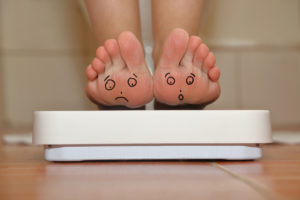 My mother was an adventurous woman. Bold, outspoken. She died from injuries sustained in a car accident at the age of 88, ten years ago in June. While it was terribly sad, her death did not feel like a tragedy. She had lived a very full life, made the most of most of her moments here on this planet.
My mother was an adventurous woman. Bold, outspoken. She died from injuries sustained in a car accident at the age of 88, ten years ago in June. While it was terribly sad, her death did not feel like a tragedy. She had lived a very full life, made the most of most of her moments here on this planet.
My mother was a model for me in many ways. Mostly, she was a wonderful model of never being too old to grow and change and of never letting fear stop you. But there is one area in which I wish she had done more—or less: my mother spent—wasted—way too much of her precious time focusing on her weight.
Weight. It’s a HEAVY issue, a heavy word, so very loaded for many of us, too many of us. How many of us have had our morning moods dictated by a number on a scale, the snugness of our clothes, a reflection in the mirror? Is there even one of us out there who can honestly say she has a healthy body image, who’s never struggled with … the concept, the connotations, the judgments of fat? (If so, I am VERY happy for you!)
FAT. Another heavy word. An “F” word, if there ever was one!
I’ve been thinking of fat lately. Of body image. Of why, after three years of writing this blog, I’ve not yet even broached the topic. I have started writing posts about my lifelong struggles with weight and body image, about all the women I know who share these experiences—but I’ve put those posts aside. Another day, Diane, I’d tell myself. You’ll write about that another day.
“Yes. That Is My Story Too”
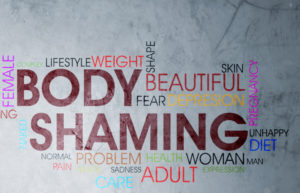 What spurred me to tap on the keys of my keyboard today is the reaction I’ve received to a piece I wrote called “Hunger,” recently published in Atlas and Alice, and another called “Phantoms” about the multigenerational pressure to lose any “excess,” anthologized in and if that mocking bird don’t sing.
What spurred me to tap on the keys of my keyboard today is the reaction I’ve received to a piece I wrote called “Hunger,” recently published in Atlas and Alice, and another called “Phantoms” about the multigenerational pressure to lose any “excess,” anthologized in and if that mocking bird don’t sing.
“Dead Man’s Float,” published in Longridge Review, was about my weight and a swimming contest in summer camp. I won the 2021 Tiferet Writing Prize for nonfiction for my essay “Heavenly Bodies in 7 Parts” about, you guessed it, my body.
I was surprised by the comments, emails, tweets about these pieces. They seemed to touch a nerve–and provide some comfort, some of that “I am not alone” feeling, some “yes, that is my story too.”
Yet, I’ve struggled with how to talk about weight with you, here, in this space.
I began today with my own projections, my own meanness towards others, which, we now know, thanks to Sonya Renee Taylor, spring from my own shame.
The message that we need to fix out bodies—lose weight, drop pounds, fight fat—is a hateful chorus that has been drummed into our heads for so long and so often, we don’t even question the refrain.
This is from a video on CNBC:
“If you’ve told yourself, ‘this is the year I’m going to lose the weight,’ you’re not alone. Each year 45 million people in the United States go on weight loss programs and there’s no shortage of options— from tailored meal plans like Slim Fast and Nutrisystem to high fat, no carb, gluten-free models like Keto and Paleo. Diet and weight loss have grown to be a $71 billion industry, yet according to studies— 95% of diets fail.”
I’ll repeat that: “Diet and weight loss have grown to be a $71 billion industry.”
And this: “According to studies— 95% of diets fail.” Oh! I read this and feel ALL THAT PAIN!!! (And SHAME!)
For You It May Not Be Fat
 For you it may not be fat. It may be your hair, your big breasts, your small breasts—we are forever being told we’re too much or too little. It may be a hearing loss. Maybe you move more slowly these days. Maybe its … your wrinkles.
For you it may not be fat. It may be your hair, your big breasts, your small breasts—we are forever being told we’re too much or too little. It may be a hearing loss. Maybe you move more slowly these days. Maybe its … your wrinkles.
According to statista.com, “In 2020, the global anti-aging market was estimated to be worth about 58.5 billion U.S. dollars. The anti-aging market is estimated to see a compound annual growth rate (CAGR) of seven percent between 2021 and 2026.”
Ladies! Is that really the best use for our money??? (Not to mention our energy and our time!)
Beauty is a changing social construct with huge economic and psychological implications. Companies who sell dieting or anti-aging products make their money when they convince us to see ourselves as somehow deficient, with one—or ten—things about our appearance that needs “fixing.”
Those with financial stakes in the game make shame their business. Those who carry the emotional stakes pay a high price (in more ways than one).
A Cultural Paradox: The Bigger You Are, the More Invisible You Become
 My personal weight-on-weight-off roller coaster began during the summer between first and second grade. My mother would not have won any “Mother-of-the-Year” contests when I was a child. (This is meant with no disrespect—she had said so herself on many occasions.) Mom had a lot of her own “stuff” going on at the time and was largely unavailable. Thankfully, my older sister stepped up and filled in important gaps. But she got married that summer and moved out, which totally upended my world. I sought and found (temporary) comfort in the refrigerator, in the pantry, in cartons of Tropicana and bags of chips Ahoy. (I would later in life abandon my love of orange juice but added a shmear of Nutella to both Chips Ahoy and Oreos!)
My personal weight-on-weight-off roller coaster began during the summer between first and second grade. My mother would not have won any “Mother-of-the-Year” contests when I was a child. (This is meant with no disrespect—she had said so herself on many occasions.) Mom had a lot of her own “stuff” going on at the time and was largely unavailable. Thankfully, my older sister stepped up and filled in important gaps. But she got married that summer and moved out, which totally upended my world. I sought and found (temporary) comfort in the refrigerator, in the pantry, in cartons of Tropicana and bags of chips Ahoy. (I would later in life abandon my love of orange juice but added a shmear of Nutella to both Chips Ahoy and Oreos!)
My compulsive eating served two counter-purposes: to make myself bigger (so I could take up space and be seen) and to help me hide—from my feelings of loss and fear, now that my sister was no longer around. The counter-purposes mirrored the paradox that exists in our culture—the bigger you are, the more invisible you become.
The Second Assault
People gain weight for all kinds of reasons—but I’ve never seen anyone put on pounds because, as much of popular culture would have you believe, she has no “will power” or is “weak.”
Sometimes, women become compulsive eaters in response to sexual or physical violation. An article in The Atlantic shares some startling statistics: “One analysis of 57,000 women in 2013 found that those who experienced physical or sexual abuse as children were twice as likely to be addicted to food than those who did not.”
The title of the article is “The Second Assault.” It fits.
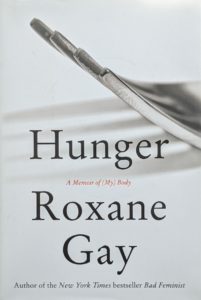 Roxane Gay, an amazing essayist whose work I greatly admire, wrote a book called Hunger: A Memoir of (My) Body in which she courageously and with great grace wrote about her own traumatic experience of brutal sexual assault. She wrote about the shame she felt because of the assault and how the experience led her to eat. And eat. And eat.
Roxane Gay, an amazing essayist whose work I greatly admire, wrote a book called Hunger: A Memoir of (My) Body in which she courageously and with great grace wrote about her own traumatic experience of brutal sexual assault. She wrote about the shame she felt because of the assault and how the experience led her to eat. And eat. And eat.
The body. The big body. It can serve as protection.
Many of us received unwanted “attention” from boys and men when we were just developing, attention that felt dirty, confusing, or, even, terrifying. We did not know what to do with it. But we had learned quite young was that if we grew our bodies, we could avert some of that unwanted yuck.
Whether or not these experiences are relatable to you (I sincerely hope they are not), we are all subjected on a regular basis to messages of how we don’t measure up. Society’s weight and beauty standards are unreachable for most of us, even though those standards are what many of us desire. What we do to ourselves in the name of meeting those goals! How we injure ourselves with our words when we don’t! That’s a travesty … and a tragedy.
Eating Disorders in Midlife and Beyond
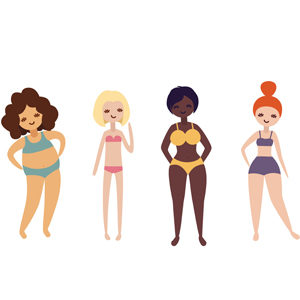 In The Body Is Not an Apology, Sonya Renee Taylor offers many opportunities to journal about our own relationships with our bodies. She calls these “Unapologetic Inquiries” (I love that!) and many of them are both enlightening and painful. Taylor asks us to remember our own earliest memory of body shame. Were we told our hair was unruly, our voices too loud, our feet too clumsy? Consider the messages/memories about our size.
In The Body Is Not an Apology, Sonya Renee Taylor offers many opportunities to journal about our own relationships with our bodies. She calls these “Unapologetic Inquiries” (I love that!) and many of them are both enlightening and painful. Taylor asks us to remember our own earliest memory of body shame. Were we told our hair was unruly, our voices too loud, our feet too clumsy? Consider the messages/memories about our size.
How many of those have we internalized? When will it be time to let them go?
Unfortunately for many people, body shame follows them into later adulthood, and, even, like my own mother, to the grave.
I lifted this directly from an article on Capital Woman’s Care website called “Eating Disorders and Older Women”:
- A 2012 study in the International Journal of Eating Disorders estimates that 13% of U.S. women 50+ have eating disorder symptoms, slightly more than the percentage diagnosed with breast cancer.
- Research shows though rates of anorexia peak at about age 26, the rates of bulimia don’t become the highest until nearly age 47 and rates of BED (binge eating disorder) don’t achieve highest level of incidence until women are in their 70s.
Here are some eye-opening stats included in the article concerning body image and feelings of shame:
- On average a woman is most dissatisfied with her body at age 54.
- 79% of women age 50+ may feel body weight/shape plays a moderate to extreme role in self-perception.”
This May Not Be a New Problem, But It Doesn’t Have to Persist!
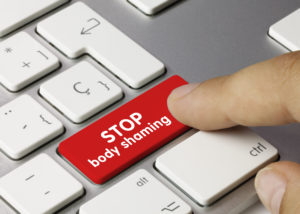 There “a new face” in eating disorders, one that includes older women, according to Holly Grishkat, PhD, site director of The Renfrew Center, in an article in Today’s Geriatric Medicine. Still, she believes “eating disorders are still primarily a disease of the youth, as most midlife women with eating disorders developed the problem prior to the age of 18. … while it may look like they are emerging later in life, most eating disordered women have been suffering since adolescence. The difference is that we are now working with women who have had the disorder for 10, 20, and 30 years … After 30 years, the eating disorder has become almost a personality characteristic for these women, as many of them define themselves by the eating disorder.”
There “a new face” in eating disorders, one that includes older women, according to Holly Grishkat, PhD, site director of The Renfrew Center, in an article in Today’s Geriatric Medicine. Still, she believes “eating disorders are still primarily a disease of the youth, as most midlife women with eating disorders developed the problem prior to the age of 18. … while it may look like they are emerging later in life, most eating disordered women have been suffering since adolescence. The difference is that we are now working with women who have had the disorder for 10, 20, and 30 years … After 30 years, the eating disorder has become almost a personality characteristic for these women, as many of them define themselves by the eating disorder.”
It’s hard to say whether the number of eating disorders is actually increasing in older women—or older women have recently been coming in more often for treatment. More research is needed.
But whether this is a continuing problem or a new one, it doesn’t have to persist. Sonya Renee Taylor offers many “tools” to help people move from self body-shaming to “the Power of Radical Self-Love.” All of these tools begin with developing greater awareness.
Join Me on a New Mission!
 For those of you who’ve been following me for a while, you know that last year I started on a mission of noticing. I mostly noticed my natural surroundings—the flora, the trees, the birds, and, possibly my favorites, the lizards.
For those of you who’ve been following me for a while, you know that last year I started on a mission of noticing. I mostly noticed my natural surroundings—the flora, the trees, the birds, and, possibly my favorites, the lizards.
I have a new mission. To notice the body-shaming messages I hear around me. AND to notice those that I hear from within. Whether these messages are directed at others (projection) or I direct them at myself.
Notice.
Without shame.
Catch myself in the act. And then practice compassion.
We all want to be “body positive” but when that proves difficult, we certainly will get nothing out of shaming ourselves for feeling shame!
I’d like to invite you to join me on this mission.
Please let me know your thoughts in a comment or an email. What have you noticed about body shame? If you’d like, you can share your own body story. The more of these stories we bring to the light, the more light we bring to the world.
See you soon!
XOXO
Diane

If You Know Another Amazing Woman (Or Person Of Any Gender!) Who Might Like To Join Us At WomanPause, Please Forward This Link: WomanPause
For one-on-one support in uncovering your voice on the page, please consider working with me! I’d love to join you on your journey!



Great article!
Always comforting knowing I am in good company.
I wonder if all of the excess weight can be rooted in body shaming…
Thank you, Sophia! And happy/not happy that we’re in this together. (Wish you were spared!)
I totally believe the excess weight is largely (if not totally) rooted in body shaming.
I think you’d love Sonya Renee Taylor’s book Your Body Is Not An Apology–it’s wonderful and inspiring!
Wonderful, painful, comforting essay. I taught a “Writing from the Body” workshop the other day and was once again overwhelmed by the hatred people (women) feel for their bodies, to the extent of referring to their bodies as “this body” instead of “my body.” I’m with you in the Reclamation journey. XOXO
Thank you Alison! “This body” instead of “my body!” OH! That hurts!!!! I am certain your workshop was incredibly healing. I love that you call this the Reclamation journey–the perfect name for it! XOXO
Ah. Such an important topic – addressed with your characteristic courage and vulnerability! Thanks for going there since many of us have already been there or still live there. This is a personal passion of mine, as you know. I lost 100 pounds at midlife after years of self-loathing due to trauma and addiction. I have now committed myself to helping women at midlife and beyond who want nothing to do with diets but want to free themselves from the shame that keeps them overeating. No woman needs to lose weight to be more beautiful or valuable – EVER – but some of us WANT to lose weight for our own reasons. I created a program for smart women who are done with diets but want to reclaim their relationship with food and their bodies and learn to love themselves more along the way. I posted a 6 minute video on my website about Diet Trauma that might be interesting to some of your readers. https://nurturedlight.com/loving-weight-loss/
Thanks again, Diane, for continuing to shine a light in those dark places for us all!
Oh Sherry! Thank you so much for sharing your journey and for the incredible program you are offering to women. I would never want to shame women who want to lose weight or shame those who choose dieting as the way. We all make the best choices for ourselves given the information at hand. I am just so grateful that you offer an alternative–a loving alternative. Having worked with you on boundaries, I know how skilled and caring you are. Diet trauma is a real thing! Thank you for sharing your video, and I encourage anyone with whom this resonates to sign up!
It’s such a tricky thing to offer weight loss options when I agree that we do NOT need to lose weight for anyone, especially not to fit in to this messed up misogynistic culture! But I found myself carrying 100 extra pounds just to “stick it to the man” so to speak – ha! My inner rebellion was making me sick and wasn’t all that effective 🙂 I eventually found a way to lose weight for ME. Thanks for the support and understanding that my message is about overcoming shame and freeing ourselves as women, not conforming to any rules. There is no one way to do this, but all of our voices are needed. Love being in this with you, my friend!
Yes, Sherry! Overcoming shame and freeing ourselves! My heart sings just hearing those words! Thank you for supporting women in that journey! LOVE being in this all with you!
Thank you, Diane! This is both very familiar and also eye-opening. I’m so grateful to be on this journey with you. Count me in! 🙂
Thank you, Rebecca! So glad we’ll be journeying together!
Diane, the swimming story is wonderful: who hasn’t pretended sick or dead when necessary!
Thanks so much, Greta! Ha! How we pretend!
Thanks for giving me some peace of mind. I lost the weight, now I struggle within a 10 pound window, wishing I would permanently drop the 10. Silly.
Oh, Greta! I’m soooo pleased the post gave you some peace of mind! We can all be so “silly,” as you say. Just notice if you feel any shame around the “silly-ness.” That to me is an extra burden–the shame about the shame! XO